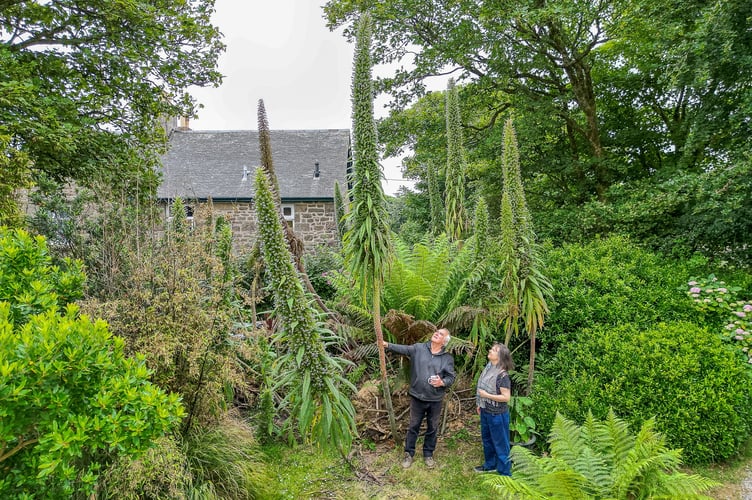A Cornish couple have grown Britain's tallest echium plant – at over 18ft tall.
Pam Betowski, 71, and husband Noel, 70, say the massive flower towers over their home.
The 18ft 4ins echium eclipses the previous UK record of 16ft set by Darren Wilson in Saltash.
Pam, a woven textile artist from Sancreed, Cornwall, credits the huge growth to her husband Noel's use of hügelkultur cultivation method.
It a traditional way of building a garden bed from rotten logs and plant debris, without disturbing the soil.
The echium pininana is an endangered biennial plant from the Canary Islands - often called a 'tree echium' for its immense growing potential.
It is used as a bedding plant or planted in borders, and grows best in full sun - particularly in the sunny southern-most counties of England.
Noel said: "They're so unusual really, they grow for around three years and then flower, and then the plant dies completely.
"Before it dies though, the plant produces thousands of seeds that spread everywhere, all over the garden.
"They grow like weeds really, I have to pull so many up. But I decided to let a few grow which became these giant plants. Those in the picture are the survivors of maybe thousands that germinated.
"The nice part about them is that they produce thousands of flowers that attract bees and wildlife, which helps support the local ecosystem.
"They're also just such a unique plant, especially in England as they struggle to deal with frost or even strong winds, despite their size.
"Some people don't like them much as they they look like 'triffids', but we're very lucky here in the far west and don't get much frost that can kill them.
"Cornwall's unique climate to the rest of the UK has meant they could survive, so it's fun that our one may have broken a record.
"I'm very interested in permaculture where you don't dig the soil, but build a raised bed out of logs and wood. While I couldn't say for sure, I think they benefitted from the nutrients of that raised bed - which helped them get to that height.
"We're also in a good area there they have been protcted well from strong winds and frosts, so overall I think they've just benefitted from lots of nutrients and good conditions to get to their height.
"But sadly, they'll be gone soon. One is already nearly brown!"






Comments
This article has no comments yet. Be the first to leave a comment.